As winter approaches, officers gear up with heavy-duty coats, winter parkas, thick gloves, wool hats, and warm boots. But police officers, who are also K9 handlers, also need to consider their K9 partners in freezing weather, says Dr. Julie Hunt, a veterinarian from Embrace Pet Insurance.
Winter Weather Tips for K9s
How to keep police K9s warm and dry when working in bitter cold.
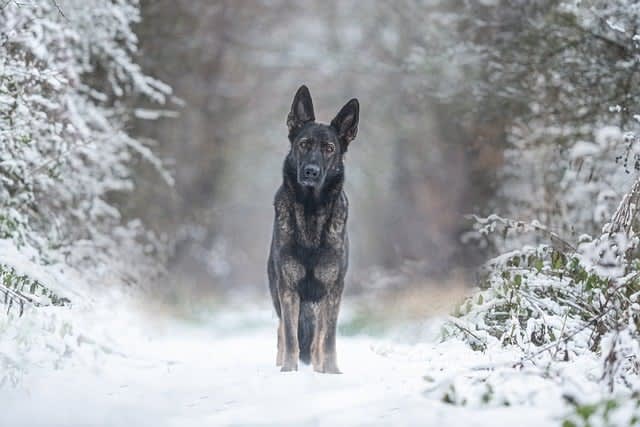
Low temperatures, particularly when combined with wind or precipitation, can still cause a dog to lose body heat quickly.
IMAGE: Pixabay, Dürken Abb
Winter preparation may seem unnecessary for dogs with thick fur. In some ways, that thinking is correct, according to Mat Glassman, a board certified veterinary surgeon. He explains, “Dogs have a great built-in mechanism for staying warm with all that fur.”
Even so, Glassman, founder and CEO of Dr. Cuddles, a pet care brand that offers pet first aid and hygiene solutions, says low temperatures, particularly when combined with wind or precipitation, can still cause a dog to lose body heat quickly. Hunt adds small, short-coated, or older K9s will get cold faster.
Dog handlers working in freezing weather must prioritize the safety of their K9 partners by keeping them warm, protected and monitoring them for cold-related health issues.
Keep Them Dry
If officers can keep their K9 partners dry while working, the dogs will probably stay warm enough, according to Glassman.
A dog that gets damp from running in the snow will probably be OK, he says, if their fur is not totally saturated. “They will still be able to maintain a thin layer of warm air next to their skin to keep them warm,” he says.
But sometimes getting saturated is inevitable, like when dogs track suspects in wet, snowy weather or accidentally fall through the ice. “When a dog gets soaked, their ability to resist the cold drops significantly,” he says.
A cold dog may start to shiver. Some shivering is OK. But when the K9 shivers uncontrollably, it's time to warm him up, says Hunt.
“Monitor your dog for signs of growing cold, including shivering,” she says. “If you think your dog may be cold, move them to a warmer area for a while before going back outside to work in the cold.”
Police dogs wear bullet-resistant vests, which may help keep them warm. A dog coat/sweater can also be worn. Hunt shares the need for a dog coat/sweater depends on the dog’s size, physical makeup (e.g., amount of body fat), age, and thickness of its fur.
“It also depends on how long the K9 will have to work in the cold and what the weather is like,” she says. “Dog sweaters are most helpful for dogs with very short coats, little body fat and that are very young or very old.”
Glassman agrees, saying, “A German Shepherd with course, thick fur, has little need for a jacket. But if they will work outside in severe cold, it doesn’t hurt to have a coat to strap on them.”
Watch the Feet
Nerve endings on dogs' toe pads make their feet extremely sensitive. This increases their paws sensitivity to ice, salt, and extreme cold.
“Snow can form ice balls in their pads that can make them uncomfortable as they work,” Glassman says. “You need to clean their feet off as you work. If the dog limps, officers should clean, warm, and remove ice balls from its paws.”
Rock salt lowers water's freezing point, melting ice on walks and streets in subzero temperatures. If a dog steps on this substance, it can burn their paw pads, cause bleeding, and lead to limping.
Hunt says, “Consider dog booties for dogs who must work for long periods on surfaces that may abrade paws, such as those with ice, salt or extreme cold.”
Glassman acknowledges boots can safeguard a dog's paws, but they might hinder a police dog's performance. “If you plan to use them, you need to get the dog used to them before they are needed,” he says.
According to Glassman, dogs do not require paw pad protection products that function like "ChapStick for the paws."
“There is no medical reason for these products,” he says. “There is nothing in the medical books that says you need to apply lanolin to dogs’ paw pads to protect them from this or that. Their paw pads are pretty robust.”
Keep them Fed and Hydrated
Dogs need about an ounce of water per pound of body weight every day or two to three times more water than food, according to Dr. Chyrle Bonk, a veterinarian and pet care consultant for Dogster.com, an online dog magazine and website.
Dr. Antje Joslin, a veterinarian consultant at Dogtopia, states this quantity of water remains unchanged during the winter.
She explains, “It’s easy to think dogs don’t need as much hydration in the winter compared to the summer, but you need to make sure the dog is hydrated at all times. They need to drink extra water for the ability to regulate their own body temperature, so make sure to provide them with plenty of water.”
Joslin also suggests giving working K9s a few extra treats during winter operations.
“Dogs will use more calories to stay warm in the winter, especially if they are working outside,” she says. “So, give them a few extra goodies to keep up their energy levels.”
Warm Them Up
Dogs can work a long time in the cold, depending on the temperatures they are acclimated to, their body fat, age, and hair coat. But severe temps, high winds and snowy days can limit that time and it’s important to be aware of that, according to Hunt.
“There is no universal amount of time that a dog can remain in the cold without negative effects,” she says. “When a dog shivers, it’s time to move them to a warmer environment. Other signs will appear later, but by that time the damage has already been done, and can include frostbite, damaged paw pads, or hypothermia.”
To warm them up, move the dog to a warm squad car or building.
“You can cover them up with a blanket to help them retain their body heat,” Hunt says. “Active heating devices such as hand warmers, heating pads and electric blankets should be used with extreme caution as they can cause thermal burns on dogs. If active heating devices are used, the dog must be conscious and physically able to move away from the heating device under its own power.”
Rubbing them with a towel or blanket is a better approach to get them warm. “Rub them up just like you would a human you are trying to warm up,” Glassman says.
More Special Units

Ohio’s Statewide Drone First Responder Program to Take Flight
Over the next two years, the Ohio DFR Pilot Program will equip municipalities with advanced drone systems, deliver comprehensive training for first responders, and enable FAA-approved Beyond Visual Line of Sight operations.
Read More →
Louisiana Motor Sergeant Dies from Injuries Suffered in June “Intentional” Crash
A motor officer, Sgt. Caleb Eisworth was on his way to participate in a funeral escort when he was struck by another vehicle.
Read More →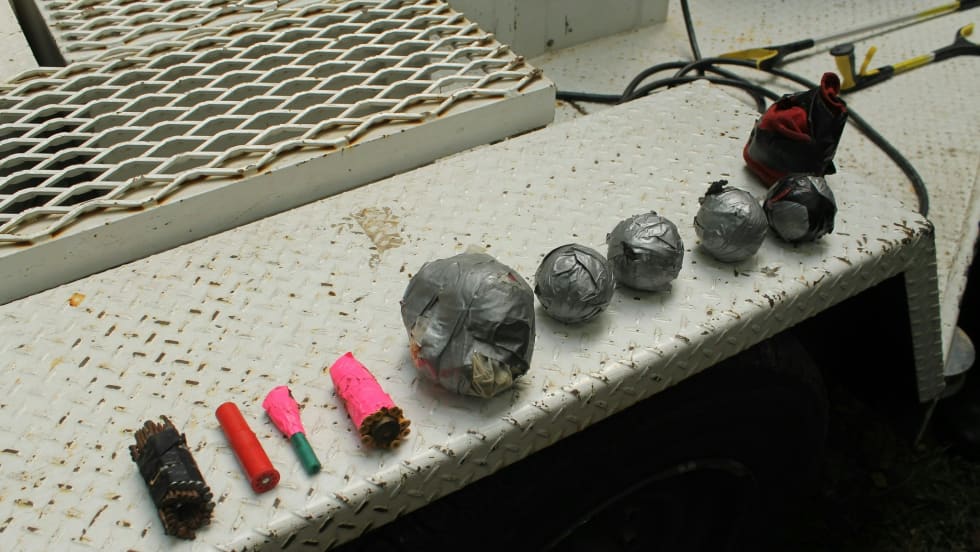
Tennessee Officers Say Man Tried to Detonate IED During Arrest
Inside the bedroom officers found what they believed to be an IED. The officers evacuated the house and called for the Chattanooga Police Bomb Squad and ATF agents.
Read More →
Florida School Officer Dies After On-Duty Medical Emergency
Sergeant Greg Graff was “preparing school leaders for the upcoming year during a safety training program at Clearwater High School,” the school district said.
Read More →
Grenade is Missing from Explosion That Killed 3 LASD Deputies
ATF Special Agent in Charge Kenny Cooper said definitively that only one grenade detonated at the facility on July 18.
Read More →
Los Angeles County Sheriff's Department Names Deputies Lost in Friday Explosion
LASD said Detective Joshua Kelley-Eklund, Detective Victor Lemus, and Detective William Osborn who were all assigned to Special Enforcement Bureau’s Arson Explosives Detail were killed in the incident.
Read More →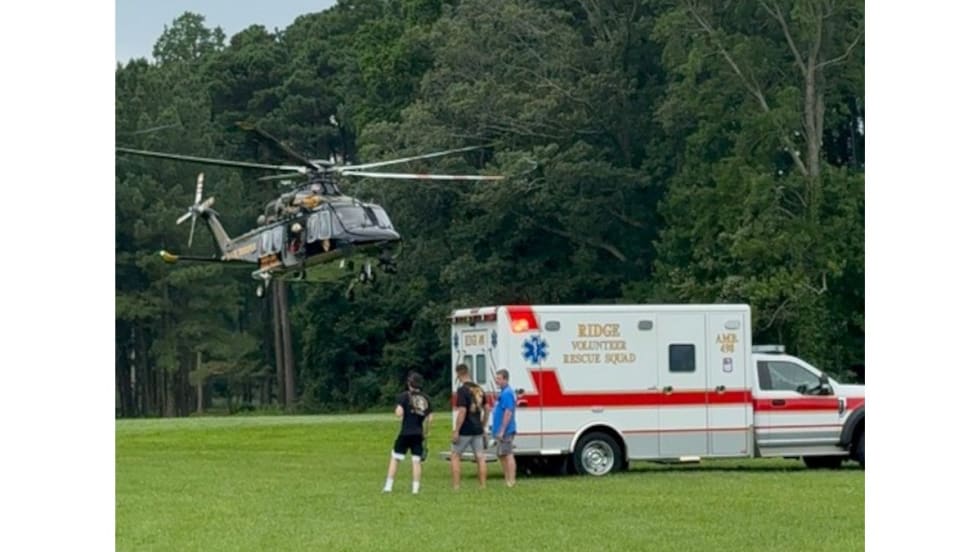
Maryland State Police Helicopter Rescues Victim from Overturned Boat in Chesapeake Bay
The Maryland State Police Aviation Command Trooper 7 crew, the MSP helicopter based in California, Maryland, were monitoring the county dispatch radio, overheard the dispatch, and self-launched.
Read More →
3 Los Angeles County Deputies Killed in Explosion Friday Morning
At press time the names of the deputies had not been released. Sheriff Robert Luna said one had served for 19 years, another for 22 years, and another for 33 years.
Read More →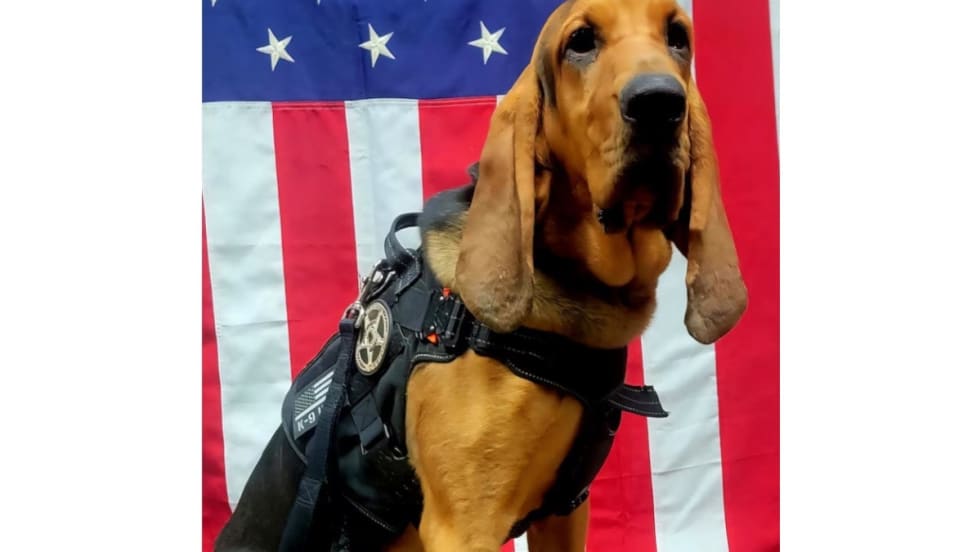
Georgia Sheriff’s Deputy Fired After K-9 Dies in Hot Patrol Vehicle
The vehicle’s air conditioning failed because of a malfunctioning compressor and its heat alarm did not function, according to the sheriff’s office.
Read More →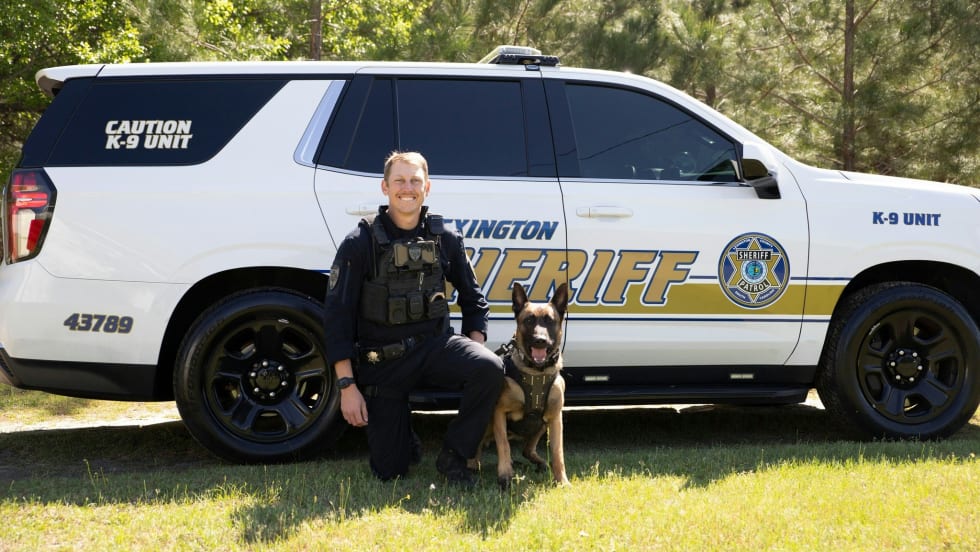
South Carolina Sheriff’s K-9 Dies After Training Session
Deputy Saunders rushed Sam to the vet as soon as soon he noticed the dog was in distress after the training, the sheriff’s department said.
Read More →

